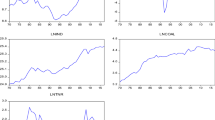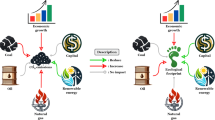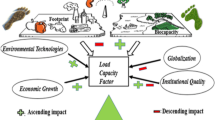Abstract
This study examines the nonlinear effect of energy use including coal, gas, oil, and electricity on CO2 emissions in European Union (EU) countries. Annual panel data of twenty-one European Union countries i.e. Austria, Azerbaijan, Belarus, Bulgaria, Belgium, Denmark, Finland, France, Greece, Germany, Hungary, Ireland, Italy, Kazakhstan, Lithuania, Netherland, Norway, Spain, Slovakia, Switzerland, and Ukraine from 1990 to 2018 is used, while panel nonlinear ARDL methodology is applied for examining the long and short run association. Findings showed that an increase in the coal, electricity, and oil usage increase carbon dioxide emissions, while a reduction in coal, electricity, gas, and oil usage reduce carbon dioxide emissions in the long run. Results of panel nonlinear ARDL (NARDL) model prove the existence of asymmetric impact of energy usage including coal, electricity, and oil on CO2 emissions in European countries. Bidirectional causality exits among positive partial sum of gas usage and CO2 emissions, as well as among partial positive component of oil usage and CO2 emissions in the short run. Pollution needs to be controlled by using new and efficient technologies by making research and development centers more efficient and productive, while the usage of renewable energy resources should be promoted by replacing the traditional energy resources to reduce emissions. ENERGY STAR strategy can be used to improve the energy performance of commercial buildings and industrial plants as well as government has to formulate policies of production which are environment friendly.

Similar content being viewed by others
References
Akbostanci, E., Turut-Asik, S., Tunc, G.I.: The relationship between income and environment in Turkey: Is there an environmental Kuznets curve? Energy Policy 37(3), 861–867 (2009)
Akin, C.S.: The impact of foreign trade, energy consumption, and income on CO2 emissions. Int. J. Energy Econ. Policy 4(3), 465–475 (2014)
Al-Amin, S.C., Huda, N., Hamid, A.: Trade, economic development and environment: Malaysian experience. Bangladesh Dev. Stud. 32(3), 19–39 (2009)
Ali, S., Anwar, S., Nasreen, S.: Renewable and non-renewable energy and its impact on enviornmental quality in South Asian countries. Forman J. Econ. Stud. 13, 177–194 (2017)
Ang, J.B.: CO2 emissions, energy consumption, and outpur in France. Energy Policy 35(10), 4772–4778 (2007)
Arminen, H., Menegaki, A.N.: Corruption, climate and the energy-environment-growth nexus. Energy Econ. 80, 621–634 (2019)
Arouri, M., Shahbaz, M., Onchang, R., Islam, F., Teulon, F.: Environmental Kuznets curve in Thailand: cointegration and causality analysis. J. Energy Dev. 39(1/2), 149–170 (2014)
Baltagi, B.H.: Econometric Analysis of Panel Data. Wiley, Hoboken (2013)
Bento, J.P.C., Moutinho, V.: CO2 emissions, non-renewable and renewable electricity production, economic growth, and international trade in Italy. Renew. Sustain. Energy Rev. 55, 142–155 (2016)
Boluk, G., Mert, M.: Fossil & renewable energy consumption, GHGs (greenhouse gases) and economic growth: evidence from a panel of EU (European Union) countries. Energy 74, 439–446 (2014)
Brun-Aguerre, R., Fuertes, A.-M., Greenwood-Nimmo, M.J.: Heads I win; tails you lose: asymmetry in exchange rate pass-through into import prices. J. R. Stat. Soc. Series A 180(2), 587–612 (2017)
Cialani C https://www.emerald.com/insight/search?q=Catia%20Cialani(2007) Economic growth and environmental quality: an econometric and a decomposition analysis. Management of Environmental Quality 18(5):568–577
Destek, M.A., Balli, E., Manga, M.: The relationship between CO2 emission, energy consumption, urbanization and trade openness for selected CEECs. Res. World Econ. 7(1), 52–58 (2016)
Dogan, E., Turkekul, B.: CO2 emissions, Real output, energy consumption, trade, urbanization and financial development: testing the EKC hypothesis for the USA. Environ. Sci. Pollut. Res. 23(2), 1203–1213 (2016)
Fisher, R.A.: Statistical Methods for Research Workers. Oliver and Boyd, Edinburgh (1932)
Granger CWJ, Yoon G (2002) Hidden Cointegration. Economics. No. 2002–02. University of California
Gujarati, D.N.: Basic Econometrics, 4th edn. McGraw-Hill, New York (2005)
Hossain, M.S.: Panel estimation for CO2 emissions, energy consumption, economic growth, trade openness and urbanization of newly industrialized economy. Energy Policy 39, 6991–6999 (2011)
Im, K.S., Pesaran, M.H., Shin, Y.: Testing for unit roots in heterogeneous panels. J. Econom. 115(1), 53–74 (2003)
Irfan, M., Shaw, K.: Modeling the effects of energy consumption and urbanization on enviornmental pollution in South Asian countries: a nonparametric panel approach. Qual. Quant. 51(1), 65–78 (2017)
Jarque, C.M., Bera, A.K.: Efficient tests for normality, homoscedasticity and serial independence of regression residuals. Econ. Lett. 6(3), 255–259 (1980)
Kasman, A., Duman, Y.S.: CO2 emissions, economic growth, energy consumption, trade and urbanization in new EU member and cnadidate countries: a panel data analysis. Econ. Model. 44, 97–103 (2015)
Khan, Z., Sisi, Z., Siqun, Y.: Environmental regulations an option: asymmetry effect of enviornmental regulation on carbon emission using non-linear ARDL. Energy Sources Part A Recovery Util. Environ. Eff. 41(2), 137–155 (2019)
Kisswani, K.M.: Evaluating the GDP–energy consumption nexus for the ASEAN-5 countries using nonlinear ARDL model. OPEC Energy Rev. 41(4), 318–343 (2017)
Levin, A., Lin, C.F., Chu, C.J.: Unit root tests in panel data: asymptotic and finit-sample properties. J. Econom. 108(1), 1–24 (2002)
Liu, X., Zhang, S., Bae, J.: The nexus of renewable energy-agriculture-environment in BRICS. Appl. Energy 204(15), 489–496 (2017)
Liu, Y., Sohail, M.T., Khan, A., Majeed, M.T.: Environmental benefit of clean energy consumption: can BRICS economies achieve environmental sustainability through human capital? Environ. Sci. Pollut. Res. 29(5), 6766–6776 (2022)
Maddala, G.S., Wu, S.: A comparative study of unit root rests with panel data and a simple new test. Oxford Bull. Econ. Stat. 61(S1), 631–652 (1999)
Magazzino, C.: The relationship between CO2 emissions, energy consumption and economic growth in Italy. Int. J. Sustain. Energ. 35(9), 844–857 (2016)
Malik, Y.M., Latif, K., Khan, Z., Butt, D.H., Hussain, M., Nadeem, A.M.: Symmetric and asymmetric impact of oil price, FDI and economic growth on carbon emission in Pakistan: evidence from ARDL and non-linear ARDL approach. Sci. Total Environ. 726, 138421 (2020)
Mbarek, M.B., Saidi, K., Rahman, M.M.: Renewable and non-renewable energy consumption, environmental degradation and economic growth in Tunisia. Qual. Quant. 52(3), 1105–1119 (2018)
Meadows, D.H., Meadows, D.L., Randers, J., Behrens, W.W.: The Limits to Growth. Universe Books, New York (1972)
Muhammad, B., Khan, M.K., Khan, M.I., Khan, S.: Impact of foreign direct investment, natural resources, renewable energy consumption, and economic growth on environmental degradation: evidence from BRICS, developing, developed and global countries. Environ. Sci. Pollut. Res. 28, 21789–21798 (2021)
Munir, K., Ameer, A.: Effect of economic growth, trade openness, urbanization, and technology on enviornment of Asian emerging economies. Manag. Environ. Qual. Int. J. 29(6), 1123–1134 (2018)
Munir, K., Ameer, A.: Nonlinear effect of FDI, economic growth, and industrialization on environmental quality: evidence from Pakistan. Manag. Environ. Qual. Int. J. 31(1), 223–234 (2020)
Munir, K., Ameer, A.: Assessing nonlinear impact of urbanization, economic growth, technology, and trade on Environment: evidence from African and Asian emerging economies. GeoJournal 87(3), 2195–2208 (2022)
Munir, K., Riaz, N.: Energy consumption and environmental quality in South Asia: evidence from panel non-linear ARDL. Environ. Sci. Pollut. Res. 26(28), 29307–29315 (2019)
Munir, K., Riaz, N.: Asymmetric impact of energy consumption on environmental degradation: evidence from Australia, China, and USA. Environ. Sci. Pollut. Res. 27(11), 11749–11759 (2020)
Musibau, H.O., Shittu, W.O., Ogunlana, F.O.: The relationship between environmental degradation, energy use and economic growth in Nigeria: new evidence from non-linear ARDL. Int. J. Energy Sect. Manag. 15(1), 81–100 (2021)
Omri, A.: CO2 emissions, energy consumption and economic growth nexus in MENA countries: evidence from simultaneous Equation models. Energy Econ. 40, 657–664 (2013)
Ozcan, B., Tzeremes, P.G., Tzeremes, N.G.: Energy consumption, economic growth and environmental degradation in OECD countries. Econ. Model. 84, 203–213 (2020)
Pesaran MH (2004) General Diagnostic Test for Cross Section Dependence in Panels. No. 1240, Institute for the Study of Labor
Pesaran, M.H., Shin, R.: Estimating long-run relationships in dynamic heterogeneous panels. J. Econom. 68(1), 79–113 (1995)
Pesaran, M.H., Shin, Y.: An Autoregressive Distributed-Lag Modelling Approach to Cointegration Analysis. In: Strom, S. (ed.) Econometrics and Economic Theory in the 20th Century: The Ragnar Frisch Centennial Symposium, pp. 371–413. Cambridge University Press, Cambridge (1999)
Pesaran, M.H., Shin, Y., Smith, R.J.: Pooled mean group estimation of dynamic heterogeneous panels. J. Am. Stat. Assoc. 94(4), 621–634 (1999)
Pesaran, M.H., Shin, Y., Smith, R.J.: Bounds testing approaches to the analysis of level relationships. J. Appl. Econom. 16(3), 289–326 (2001)
Rafindadi, A.A., Usman, O.: Globalization, energy use, and environmental degradation in South Africa: startling empirical evidence from the Maki-cointegration test. J. Environ. Mang. 244, 265–275 (2019)
Raggad, B.: Economic development, energy consumption, financial development, and carbon dioxide emissions in Saudi Arabia: new evidence from a nonlinear and asymmetric analysis. Environ. Sci. Pollut. Res. 27, 21872–21891 (2020)
Sahir, M.H., Qureshi, A.H.: Specific concerns of Pakistan in the context of energy security issues and geopolitics of the region. Energy Policy 35(4), 2031–2037 (2007)
Saidi, K., Hammami, S.: The impact of CO2 emissions and economic growth on energy consumption in 58 countries. Energy Rep. 1, 62–70 (2015)
Salisu, A.A., Isah, K.O.: Revisiting the oil price and stock market nexus: a nonlinear panel ARDL. Econ. Model. 66, 258–271 (2017)
Schorderet Y (2003). Asymmetric Cointegration. No. 2003.01. University of Geneva
Shafiei, S., Salim, R.A.: Non-renewable and renewable energy consumption and CO2 emissions in OECD countries: a comparative analysis. Energy Policy 66, 547–556 (2014)
Shahbaz, M., Mahalik, M.A., Shah, S.H., Sato, J.R.: Time-varying analysis of CO2 emissions, energy consumption, and economic growth nexus: Statistical experience in next 11 countries. Energy Policy 98, 33–48 (2016)
Shahbaz, M., Nasir, M.A., Roubaud, D.: Environmental degradation in France: the effects of FDI, financial development, and energy innovations. Energy Econ. 74, 843–857 (2018)
Sheng, Z.C., Wen, N.S., Xin, Z.: Effects of household energy consumption on environment and its influence factor in urban and rural areas. Energy Procedia 14, 805–811 (2012)
Shin, Y., Yu, B., Greenwood-Nimmo, M.J.: Modelling Asymmetric Cointegration and Dynamic Multipliers In A Nonlinear ARDL Framework. In: Horrace, W.C., Sickles, R.C. (eds.) Festschrift in Honor of Peter Schmidt: Econometric Methods and Application, pp. 281–314. Springer Science & Business Media, New York (NY) (2014)
Sohail, M.T., Ullah, S., Majeed, M.T., Usman, A., Andlib, Z.: The shadow economy in South Asia: dynamic effects on clean energy consumption and environmental pollution. Environ. Sci. Pollut. Res. 28(23), 29265–29275 (2021)
Toumi, S., Toumi, H.: Asymmetric causality among renewable energy consumption, CO2 emissions, and economic growth in KSA: EVIDENCE from non-linear ARDL Model. Environ. Sci. Pollut. Res. 26(16), 16145–16156 (2019)
UNCTAD (2010) Trade and Environment Review: Promoting poles of clean growth to foster the transiion to a more sustained economy. United Nations Conference on Trade and Development
Wooldridge, J.M.: Econometric Analysis of Cross Section and Panel Data. MIT Press, Cambridge (2010)
Funding
The authors have not disclosed any funding.
Author information
Authors and Affiliations
Corresponding author
Ethics declarations
Conflict of interest
The authors have not disclosed any competing interests.
Additional information
Publisher's Note
Springer Nature remains neutral with regard to jurisdictional claims in published maps and institutional affiliations.
Rights and permissions
About this article
Cite this article
Munir, K. Energy use and environmental degradation in Europe: evidence from panel nonlinear ARDL. Qual Quant 57, 2529–2543 (2023). https://doi.org/10.1007/s11135-022-01473-y
Accepted:
Published:
Issue Date:
DOI: https://doi.org/10.1007/s11135-022-01473-y




